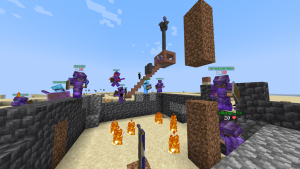Siege of Giza
| ||||||||||||||||||||||||||||
Background
The Greek-Ottoman Rivalry, one of the most defining conflicts in EarthPol history, first ignited during the Great War of Version 4. Tensions between the two powers only escalated after defeat of Deutschland at the Siege of Linz, where SQPR forces secured a decisive victory. As Version 5 (V5) began, the wounds of V4 had not healed — and the Greek people, especially their leadership, were determined to seek revenge and restore their honor.
Over the course of several weeks, Greece focused heavily on military buildup, recruiting fighters, constructing infrastructure, and preparing for future conflicts. However, this preparation soon led to boredom and unrest within Greece’s powerful PvP clan, Vespa, whose members grew impatient and began demanding action. Many Vespa fighters pushed for an immediate offensive, regardless of strategy or diplomacy.
Despite early efforts to delay aggression, King arescartier eventually gave in to the pressure and moved forward with war planning. The target was chosen carefully: Islamic Egypt, a nation directly south of Greece and a loyal ally of the Ottomans, presented both a strategic and symbolic opportunity. Striking Islamic Egypt would send a clear message to the Ottomans and fulfill Vespa’s desire for battle. Thus began the preparations for what would become the Siege of Giza, the first major battle of the Greco-Ottoman War in V5.
Conflict
Day 1
Siege Assembly: The Siege of Giza began on August 2nd, 2022 at 8:23 PM EST, marking the opening battle of the Greco-Ottoman War on EarthPol. The conflict was initiated when the Kingdom of Greece, alongside their military outpost New_Sparta, launched a surprise siege against the city of Giza, held by the nation of Islamic Egypt. Greece deployed an overwhelming force of 42 online players, while Islamic Egypt had only 3 players online at the time. The siege began with the placement of the Greek banner, officially triggering the siege assembly phase. During this phase, Greek forces rapidly constructed fortifications using netherrack and other easily accessible blocks. These makeshift defenses allowed the attackers to secure territory and prepare for the siege itself. The sheer difference in manpower and the surprise of the banner drop gave Greece a significant early advantage. Despite being outnumbered, the defenders attempted to delay construction and resist the attackers as best they could during the assembly phase.

